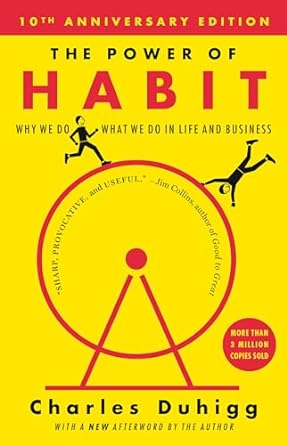Charles Duhigg’s “The Power of Habit” takes us on a journey through the fascinating realm of habits and their profound impact on our lives. The book is like a backstage pass to the intricate workings of our brains and how habits shape who we are. Perfect Book to start 2024 reading after the “Compounding Effect”!

- 1. The Habit Loop: Duhigg’s introduction of the Cue-Routine-Reward loop is a game-changer. It’s not just a theoretical concept; it’s a roadmap to understanding our behaviors. The cue acts as the trigger, the routine is the behavior itself, and the reward is the positive reinforcement that solidifies the habit. Recognizing and dissecting this loop gives us the power to intervene and reshape our habits consciously.
- 2. Neuroscience Unveiled: Duhigg takes us on a tour of the brain, explaining how habits are etched into our neural pathways. The science behind habits is not just fascinating; it’s empowering. Understanding that habits are a product of our brain’s efficiency, seeking the path of least resistance, provides a profound insight into why we do what we do.
- 3. Small Wins, Big Changes: Celebrating small victories isn’t just about feeling good. Duhigg shows us that these moments of triumph aren’t insignificant; they are the building blocks of significant habit changes. By focusing on achievable goals and acknowledging our progress, we create a positive feedback loop that propels us towards more substantial transformations.
- 4. Keystone Habits: Identifying keystone habits is like finding the linchpin in a system. Duhigg illustrates how certain habits have a ripple effect, influencing other aspects of our lives. By pinpointing and nurturing these keystone habits, individuals can strategically instigate positive changes across various dimensions of their daily routines.
- 5. The Golden Rule: Duhigg introduces a pragmatic approach to habit change – if you can’t completely eliminate a bad habit, alter the routine while preserving the cue and reward. This golden rule recognizes the challenge of breaking habits outright and offers a more realistic strategy for gradual transformation.
- 6. Belief in Change: Beyond sheer willpower, Duhigg emphasizes the importance of believing in our capacity for change. This psychological shift is a catalyst for breaking free from destructive habits. It’s a subtle yet potent aspect of habit transformation that goes beyond the mechanical aspects of the habit loop.
- 7. Habits in Organizations: Applying the habit loop to organizations is a unique angle. Duhigg demonstrates how understanding and shaping collective habits can redefine company culture. It’s not just about individual behaviors; it’s about the shared routines that shape the ethos of an entire workplace.
- 8. Craving Decoded: Cravings often seem like mysterious urges, but Duhigg decodes their origins. By understanding the psychology of cravings, individuals can gain a better grasp of their habits. Unraveling the connection between cravings and habits provides a strategic lever for modifying behavior.
- 9. Social Influence: Our habits aren’t formed in isolation; they’re influenced by those around us. Duhigg explores the social dynamics of habits, shedding light on how our behaviors are shaped by the people in our lives. It’s a reminder of the significant role our social circles play in the cultivation and reinforcement of habits.
- 10. Civil Rights and Habits: In an unexpected twist, Duhigg connects habits to historical events, such as the civil rights movement. By showcasing how habits can drive societal change, he underscores the broader implications of our routines. It’s a thought-provoking exploration of the intersection between personal habits and collective movements.
Conclusion: “The Power of Habit” is more than a self-help book; it’s a guide to understanding the intricate dance between cues, routines, and rewards that shape our lives. Duhigg’s blend of scientific insights and real-world examples makes it a compelling read for anyone looking to break free from destructive habits or cultivate positive ones.
